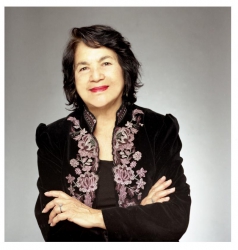March 23, 2015
Women’s History Month: Celebrating the Lives of Addie Wyatt and Dolores Huerta
The third week of Women’s History Month gives us an opportunity to pay tribute to Addie Wyatt and Dolores Huerta, two extraordinary women who were shaped by the Great Depression, fought for workers’ rights during the height of the American Feminist Movement, and changed the face of organized labor.
Addie Loraine Cameron, better known as Addie L. Wyatt (1924 –2012), was born in Mississippi and moved to Chicago with her family in 1930. When she was 17 years old, she married Claude S. Wyatt, Jr.
She began working in the meatpacking industry in 1941. Although she applied for a job as a typist for Armour and Company, African American women were barred from holding clerical positions and she was sent to the canning department to pack stew in cans for the army. Due to a contract between Armour and the United Packinghouse Workers of America (UPWA), she earned more working on the packinghouse floor canning stew than she would have made working as a typist, and joined the UPWA after learning that the union did not discriminate against its members.
In 1953, she was elected vice president of UPWA Local 56. In 1954, she became the first woman president of the local, and was soon tapped to serve as an international representative. She held this position through the 1968 merger of UPWA and the Amalgamated Meat Cutters and Butcher Workmen until 1974, when she became director of the newly formed Women’s Affairs Department. In 1970s, she became the first female international vice president in the history of the Amalgamated Meat Cutters and Butcher Workmen and later served as director of its Human Rights and Women’s Affairs and Civil Rights Departments. She served as the first female African American international vice president of the UFCW after Amalgamated and the Retail Clerks International Union merged in 1979.
She and her husband were ordained ministers and founded the Vernon Park Church of God in Chicago. She played an integral role in the civil rights movement, and joined Dr. Martin Luther King, Jr. in major civil rights marches, including the March on Washington, the march from Selma to Montgomery, Alabama, and the demonstration in Chicago. She was one of the founders of the Coalition of Labor Union Women, the country’s only national organization for union women. She was also a founding member of the Coalition of Black Trade Unionists and the National Organization of Women.
In 1984, Addie Wyatt retired from the labor movement as one of its highest ranked and most prominent African American and female officials. In honor of her work, she was named one of Time magazine′s Women of the Year in 1975, and one of Ebony magazine′s 100 most influential black Americans from 1980 to 1984. The Coalition of Black Trade Unionists established the Addie L. Wyatt Award in 1987. She was inducted into the Department of Labor’s Hall of Honor in 2012.
Dolores Clara Fernandez, better known as Dolores Huerta, was born in 1930 in New Mexico, and grew up in the farming community of Stockton, California. She earned a teaching degree at Delta Community College. During that time, she met her first husband. She later married Ventura Huerta. In the early 1950s, she worked as an elementary school teacher, and many of her students were the children of farm workers who were living in poverty. Teaching the children of farm workers had a profound impact on her, and in 1955, she became one of the founders of the Stockton chapter of the Community Services Organization (CSO), which worked to improve social and economic conditions for farm workers and fight discrimination. Through her work at the CSO, she met Cesar Chavez.
In 1960, she helped create the Agricultural Worker’s Association (AWA), and in 1962, she and Chavez launched the National Farm Workers Association (NFWA), the predecessor to the United Farm Workers Union (UFW).
In 1965, she helped to organize the historic Delano Grape Strike and consumer boycott against growers of table grapes in California. The strike involved thousands of grape workers and was a significant victory for the UFW—leading to a first contract with these growers. In 1967, the NFWA combined with the AWA to create the United Farm Workers Organizing Committee. During this time, she negotiated contracts for workers, fought against the use of harmful pesticides, and advocated for unemployment and healthcare benefits for agricultural workers. In 1973, she led another successful consumer boycott against California grape growers that resulted in the California Agricultural Labor Relations Act of 1975, which allowed farm workers to form unions and bargain for better wages and working conditions.
Dolores Huerta stepped down from her position at the UFW in 1999, and established a foundation where she continues her work to improve the lives of workers, immigrants and women. She has received many honors for her activism, including the Presidential Medal of Freedom in 2012.
To learn more about Dolores Huerta, follow her on Twitter (@DoloresHuerta) or visit her foundation’s website at http://doloreshuerta.org/.
